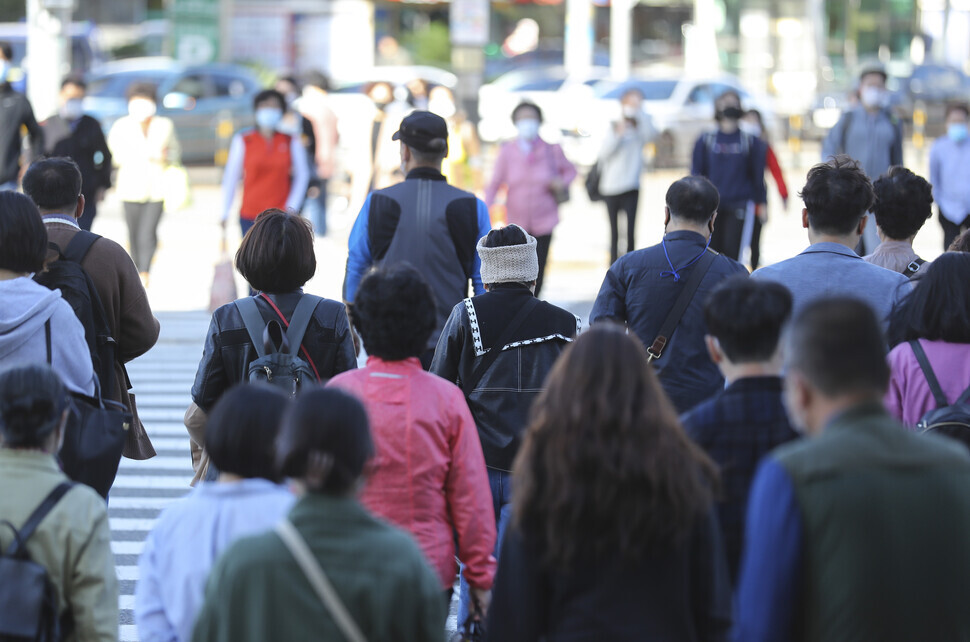hankyoreh
Links to other country sites 다른 나라 사이트 링크
Koreans take the fewest number of sick days among OECD countries

Encouraging people to take three to four days off work when they are ill is one of the government’s main initiatives for tackling COVID-19. However, how many actually take time off in accordance with this rule? A survey of 3,780 office workers conducted by Workplace Gabjil (“Workplace Abuse”) 119, a civic organization, found that 43.4% of respondents were unable to freely use their annual leave even when they become sick. Only 44.9% of workers said they would take the opportunity to rest at home if it were available, even without pay. This suggests that at least 40% of office workers are unable to properly recuperate when sick even if they would like to rest, and those that do take time off are reluctant to use annual leave due to having their pay docked.
This is related to the fact that unlike in other developed nations, Korea still lacks proper legal mechanisms such as paid sick leave or accident and sickness benefits that allow people to take time off for illnesses unrelated to work. The Labor Standards Act contains no provisions on leave or time off for accidents or illnesses unrelated to one’s job. While rules of this nature exist in special systems such as industrial accident insurance or for certain groups such as civil servants and employees at large corporations, these only apply to a fraction of the workforce as a whole.
A survey conducted by the Organisation for Economic Co-operation and Development (OECD) confirms this reality. In response to the question “How many days in a year do you take off sick?” Korean workers reported just two days. This was the lowest figure among OECD member countries, and cannot be explained away as the result of Korean workers being particularly healthy.
Lithuania was found to have the highest number of days off in this survey, with respondents reporting 24.4 days. This was followed by Latvia with 19.4 days, Austria with 17.3, Germany with 11.7, France with 9.2 and Denmark with 8.2. The figures for the US and the UK were four and 4.4 days, respectively. “[These statistics] clearly show that Korean workers are unable to fully enjoy their right to rest when ill,” said Kim Gi-tae, a doctor at the Korea Institute for Health and Social Affairs. “Considering the extent to which Korean workers are overworked and work even when they are sick, it is time to think about laying the groundwork for introducing an accident and sickness benefit.” In the Workplace Gabjil 119 survey, 90.3% of respondents also agreed on the need to introduce a system where the government provides sickness benefits.
By Lee Chang-kon, senior staff writer
Please direct comments or questions to [english@hani.co.kr]

Editorial・opinion
![[Editorial] Perilous stakes of Trump’s rhetoric around US troop pullout from Korea [Editorial] Perilous stakes of Trump’s rhetoric around US troop pullout from Korea](https://flexible.img.hani.co.kr/flexible/normal/500/300/imgdb/original/2024/0509/221715238827911.jpg) [Editorial] Perilous stakes of Trump’s rhetoric around US troop pullout from Korea
[Editorial] Perilous stakes of Trump’s rhetoric around US troop pullout from Korea![[Guest essay] Preventing Korean Peninsula from becoming front line of new cold war [Guest essay] Preventing Korean Peninsula from becoming front line of new cold war](https://flexible.img.hani.co.kr/flexible/normal/500/300/imgdb/original/2024/0507/7217150679227807.jpg) [Guest essay] Preventing Korean Peninsula from becoming front line of new cold war
[Guest essay] Preventing Korean Peninsula from becoming front line of new cold war- [Column] The state is back — but is it in business?
- [Column] Life on our Trisolaris
- [Editorial] Penalties for airing allegations against Korea’s first lady endanger free press
- [Editorial] Yoon must halt procurement of SM-3 interceptor missiles
- [Guest essay] Maybe Korea’s rapid population decline is an opportunity, not a crisis
- [Column] Can Yoon steer diplomacy with Russia, China back on track?
- [Column] Season 2 of special prosecutor probe may be coming to Korea soon
- [Column] Park Geun-hye déjà vu in Yoon Suk-yeol
Most viewed articles
- 1‘Free Palestine!’: Anti-war protest wave comes to Korean campuses
- 260% of young Koreans see no need to have kids after marriage
- 3Korean president’s jailed mother-in-law approved for parole
- 4In Yoon’s Korea, a government ‘of, by and for prosecutors,’ says civic group
- 5Nuclear South Korea? The hidden implication of hints at US troop withdrawal
- 6[Photo] ‘End the genocide in Gaza’: Students in Korea join global anti-war protest wave
- 7Behind-the-times gender change regulations leave trans Koreans in the lurch
- 8[Editorial] Perilous stakes of Trump’s rhetoric around US troop pullout from Korea
- 9Korea likely to shave off 1 trillion won from Indonesia’s KF-21 contribution price tag
- 10Yoon’s revival of civil affairs senior secretary criticized as shield against judicial scrutiny